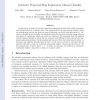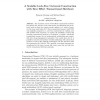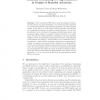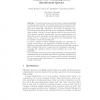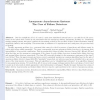106
click to vote
WDAG
2010
Springer
14 years 12 months ago
2010
Springer
Abstract. Cooperation, a necessity for any peer-to-peer (P2P) cooperative service, is often achieved by rewarding good behavior now with the promise of future benefits. However, in...
104
click to vote
WDAG
2010
Springer
14 years 12 months ago
2010
Springer
In this paper, we study the exclusive perpetual exploration problem with mobile anonymous and oblivious robots in a discrete space. Our results hold for the most generic settings:...
161
click to vote
WDAG
2010
Springer
14 years 12 months ago
2010
Springer
The imminent arrival of best-effort transactional hardware has spurred new interest in the construction of nonblocking data structures, such as those that require atomic updates to...
138
click to vote
WDAG
2010
Springer
15 years 14 days ago
2010
Springer
Abstract. Since in general it is NP-hard to solve the minimum dominating set problem even approximatively, a lot of work has been dedicated to central and distributed approximation...
100
click to vote
WDAG
2010
Springer
15 years 14 days ago
2010
Springer
In a synchronous queue, producers and consumers handshake to exchange data. Recently, new scalable unfair synchronous queues were added to the Java JDK 6.0 to support high performa...
120
click to vote
WDAG
2010
Springer
15 years 14 days ago
2010
Springer
Abstract. We argue that failure detectors encapsulate fairness. Fairness is a measure of the number of steps a process takes relative to another processes and/or messages in transi...
124
click to vote
WDAG
2010
Springer
15 years 14 days ago
2010
Springer
We argue that traditional synchronization objects, such as locks, conditions, and atomic/volatile variables, should be defined in terms of transactions, rather than the other way ...
104
click to vote
WDAG
2010
Springer
15 years 14 days ago
2010
Springer
Abstract. We give randomized agreement algorithms with constant expected running time in asynchronous systems subject to process failures, where up to a minority of processes may f...
108
click to vote
WDAG
2010
Springer
15 years 14 days ago
2010
Springer
Most people believe that renaming is easy: simply choose a name at random; if more than one process selects the same name, then try again. We highlight the issues that occur when t...
139
click to vote
WDAG
2010
Springer
15 years 14 days ago
2010
Springer
Abstract: Due the multiplicity of loci of control, a main issue distributed systems have to cope with lies in the uncertainty on the system state created by the adversaries that ar...

